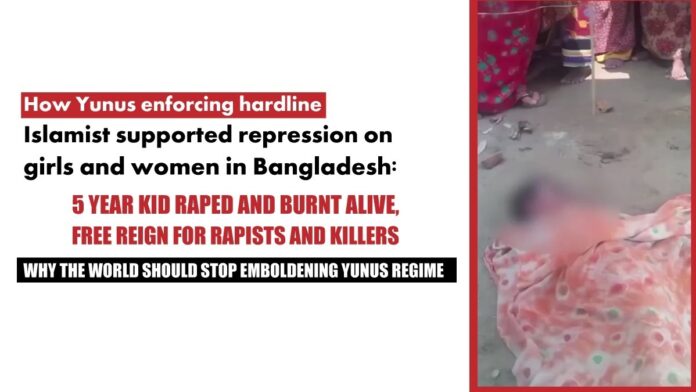In a harrowing incident that has shaken the conscience of the nation, the charred body of a five-year-old girl—raped and then burned alive—was discovered this week, laying bare the extent of unchecked gender-based violence under the Dr Yunus regime. The child’s brutal murder is not just a tragedy; it is a chilling symbol of the deepening gender apartheid sweeping across Bangladesh since Yunus’s controversial rise to power.
According to local authorities and eyewitness reports, the girl had gone missing from her village in northern Bangladesh. Hours later, her body was found in a nearby field, partially burned, with forensic reports confirming rape prior to immolation. No suspects have yet been arrested, and police have refused to comment on whether any investigation is underway.
This is not an isolated crime. Since August 2024, following Dr Yunus’s installation as the de facto head of the interim regime, the country has seen an alarming collapse in the safety and rights of women and girls. Dozens of convicted rapists have been quietly released from prisons in recent months—many with direct links to Islamist hardliners who now hold informal influence over local law enforcement and judicial offices.
Rights activists say the rise in brutality reflects a broader ideological shift, as the Yunus regime increasingly empowers Islamist factions known for their hostility toward gender equality and women’s autonomy. In multiple regions, girls have been forced out of school under veiled community “guidance,” women harassed for not wearing headscarves, and female athletes prevented from playing sports. In Dhaka, young women riding motorcycles have been physically attacked by Islamist vigilantes, emboldened by the state’s silence.
“This isn’t just lawlessness—it’s ideological repression,” said a prominent women’s rights lawyer, speaking on condition of anonymity for fear of reprisal. “The regime is enabling a Taliban-style rollback of women’s rights. Every girl in Bangladesh is now at risk.”
The situation has prompted growing concern among international observers, yet global institutions—including several Western governments and development organizations—continue to engage with the Yunus regime under the guise of “stability.” Critics argue that this tacit endorsement not only legitimizes state-enabled gender violence but also emboldens extremist forces shaping public policy in the shadows.
“The world must wake up,” said a South Asia policy analyst based in Geneva. “Every dollar in aid, every photo-op with Dr Yunus sends the message that this repression is tolerable. It’s not.”
As Bangladesh descends into a climate of fear, especially for women and girls, civil society groups are calling for urgent international pressure to halt the regime’s growing embrace of hardline Islamist politics—and to restore the rights, freedoms, and safety of half the country’s population.
Until that happens, the burnt remains of a five-year-old girl will serve as a tragic symbol of the horrors now normalized under the Yunus regime—and a warning of what may come next.

